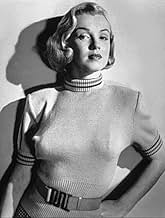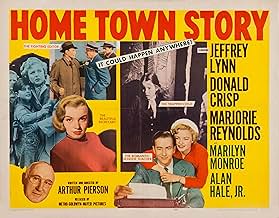Füge eine Handlung in deiner Sprache hinzuAfter failing to be re-elected, politician Blake Washburn returns home and becomes editor of the local newspaper. When he notices the influence the paper has on the public, he uses it to app... Alles lesenAfter failing to be re-elected, politician Blake Washburn returns home and becomes editor of the local newspaper. When he notices the influence the paper has on the public, he uses it to appeal to potential voters in the next election.After failing to be re-elected, politician Blake Washburn returns home and becomes editor of the local newspaper. When he notices the influence the paper has on the public, he uses it to appeal to potential voters in the next election.
- Katie Washburn
- (as Melinda Plowman)
- Hospital Nurse
- (Nicht genannt)
- Jimmy
- (Nicht genannt)
- Don
- (Nicht genannt)
Empfohlene Bewertungen
This unreleased GM inhouse movie was on TV as a late night movie recently (probably because it had two minutes of yet-to-be-a-star Marilyn Monroe in it), it was so awful I had to find out who wrote, directed and produced it. As I said, it was produced by GM - the writer and director was Arthur Pierson. Four years later Pierson would direct "Born In Freedom: The Story of Colonel Drake", a 30 minute movie about the beginning of the oil industry. I had read how US corporations produced a lot of these propaganda films (as well as books etc.) in the 1950's and tried to get them out there before they came upon more subtle and persuasive techniques and not this hard, bang-you-over-the-head with Soviet-style shoddy propaganda. If anything, this movie is an artifact of that happening, and perhaps interesting in that respect.
The movie starred Jeffrey Lynn as Blake Washburn - a one term state senator who's defeated for re-election and can't let it go. In fact he's the poster boy for sore losers, ready to pick fights with anybody who brings his defeat up, and convinced that the people were tricked into voting for his opponent. Frankly, he was a thoroughly unlikable character. Returning to his hometown, he uses his new position as editor of the family-run newspaper to criticize the man who beat him and to take on a variety of crusades, most notably against excess corporate profits. In that sense, the movie perhaps had some potential to provide a degree of social analysis, except that there was always question as to whether Washburn really cared about these issues, or whether he was simply using the paper as a platform to launch another election bid. In the end, the movie actually becomes a celebration of the system, as Washburn learns why profits are necessary, and how a company's profits benefit us all.
I found this most interesting for the very early look at Monroe, as well as for a look at a not bad piece of work from a young Alan Hale, Jr., who I know best as the Skipper from "Gilligan's Island." One thing really made me curious - how could Lynn play the brother of young Katie, played by Melinda Plowman, who got a few years as a bit player out of an acting career? Lynn would have been 42 when this was made, Plowman about 10. The family relationship was not at all believable. 4/10
Jeffrey Lynn plays Blake Washburn--an ex-senator with a serious chip on his shoulder. He's mad he lost the re-election and is bent on punishing the guy responsible. So, as the new editor of a newspaper, he's bent on attacking the MacFarland family business--because the factory owner's son beat Washburn in the election! If Washburn sounds like a petty jerk, then you are correct. In addition to using the paper for his personal vendetta, he seriously ignores his incredibly long-suffering fiancé. Therein lies much of the problem with the film--the main character is unlikable and you really want a piano to fall on his head (or some equally horrid accident). Additionally, the film has a very odd message about economics and capitalism that COULD have been excellent had the message not been hammered home so poorly. Overall, despite the MGM glitz and a few good actors (I like the Washburn kid), it's a film that needed more time to allow the plot to move realistically instead of being so rushed and contrived.
The supporting cast almost makes it worth seeing by itself. How often do you see the combination of Marilyn Monroe, Donald Crisp, and Alan Hale, Jr. in the same movie? Monroe appears in several scenes, and although only one gives her any significant screen time, she does get the chance to command some attention. Hale is well-cast as the good-natured sidekick. Crisp's talent and experience keeps the last portion of the movie from coming apart. The lively Marjorie Reynolds is also in the cast, but her character doesn't give her many opportunities to show what she can do.
The story line was overtly designed to accommodate the corporate backers of the movie, and now it is really only of interest as a look at some common perceptions of its day. The last part of the movie did have the potential for some fairly effective melodrama, but parts of it become rather labored, and it is mainly thanks to Crisp's restrained performance that it remains watchable.
Jeffery Lynn is cast as the leading character, and while he has his moments, he does not really have the range to make a routine story like this work effectively. He does not make his character very likable or interesting, and as a result his character's perspective is largely trivialized. That plus the rather routine script make it a largely unmemorable movie, aside from the curiosity factor that it offers.
Wusstest du schon
- WissenswertesMarilyn Monroe was often expected to provide her own wardrobe, a common practice in Hollywood at the time. The sweater with the grey body and black sleeves that she wears worn previously in Rollschuhfieber (1950) and in the final scene in Alles über Eva (1950).
- PatzerWhen Blake arrives home, his mother is listening to a radio show that states it is a Saturday afternoon program, but the next morning (which should be Sunday) Katie gets on a bus to go to school.
- Zitate
Iris Martin: I always treat men with respect so they do the same to me.
Slim Haskins: Let me know when that works!
- VerbindungenFeatured in Vampira and Me (2012)
Top-Auswahl
- How long is Home Town Story?Powered by Alexa
Details
- Erscheinungsdatum
- Herkunftsland
- Sprache
- Auch bekannt als
- Hometown Story
- Drehorte
- Produktionsfirmen
- Weitere beteiligte Unternehmen bei IMDbPro anzeigen
- Laufzeit1 Stunde 1 Minute
- Farbe
- Seitenverhältnis
- 1.37 : 1
Zu dieser Seite beitragen




































